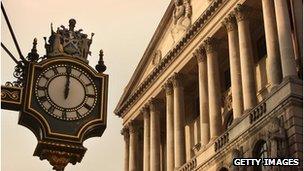Bank of England facing review of bank crisis role
- Published

The Bank of England has been criticised for not acting sooner to help avert the financial crisis
The Bank of England's supervisory court has commissioned three independent reviews into its performance during the financial crisis.
They will examine support for UK banks immediately after Lehman Brothers' collapse, subsequent liquidity to the banking system, and the Monetary Policy Committee's forecasting record.
Sir David Lees, Court chairman, said "practical lessons" would be learnt.
However, a senior conservative MP said the review did not go far enough.
'Shouted' warning
Earlier this month Bank governor Sir Mervyn King conceded that more could have been done to avert the financial crisis.
He told the BBC: "With the benefit of hindsight, we should have shouted from the rooftops that a system had been built in which banks were too important to fail, that banks had grown too quickly and borrowed too much, and that so-called 'light-touch' regulation hadn't prevented any of this."
Some critics have targeted Sir Mervyn himself, with Labour's former City minister, Lord Myners, calling him the "least distinguished" governor in nearly 100 years.
The three men leading the reviews are Bill Winters, JP Morgan's former head of investment banking, Ian Plenderleith, who had a long career at the Bank before leaving in 2002, and David Stockton, former head of economic research at the US Federal Reserve Board.
Mr Plenderleith will examine the Bank's 2008-9 Emergency Liquidity Assistance rescue scheme for Royal Bank of Scotland and Halifax Bank of Scotland.
Mr Winters will look into the effectiveness and framework of the Special Liquidity Scheme, which underpinned the UK banking system as a whole. Under the SLS banks could temporarily swap assets that were difficult to trade, such as mortgage-backed debt, for UK Treasury Bills.
Finally, Mr Stockton will review the MPC's forecasting record and its success in analysing the banking system in the run-up to and during the financial crisis.
The Court of the Bank of England, the Bank's non-executive arm, is responsible for managing the affairs of the organisation but not the formulation of monetary policy.
'Important lessons'
Sir David Lees said: "The Court of the Bank of England believes it is important for the Bank to learn practical lessons from past experience in order to improve the way it operates in the future."
Sir Mervyn said: "I welcome this set of reviews. Major changes to the operations of the Bank have already been made in the light of the financial crisis.
"These detailed, independent reviews will help to ensure that all the important lessons for the future have been learned."
The Bank's governance and newly-acquired powers will not be looked at and critics said the reviews did not go far enough.
The chairman of the Commons' Treasury Committee, Andrew Tyrie, has repeatedly called for a review of the steps the Bank took during the crisis, especially as it will become the UK's main financial regulator next year.
Mr Tyrie said the reviews fell short of what was needed, criticising the timing and the scope of the review.
"The conclusions of a comprehensive review... could, and should, have been available to inform the legislation currently before parliament to reform financial regulation."
He believes the Court should be given more powers.
- Published3 May 2012
- Published3 May 2012